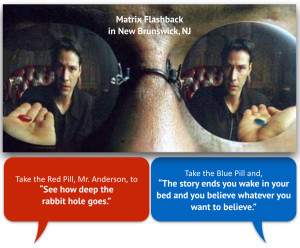 Arnold Anderson has a reputation--he's actually notorious. He's a math teacher at Roosevelt Elementary School in New Brunswick, NJ, who was tardy over 110 times in the last two school years. As reported in the Courier News ("Teacher keeps $90K job after being late 111 times"), due to his 14 years of experience and the local public school compensation schedule, Mr. Anderson is very well paid at over $90,000 in salary and benefits.
Arnold Anderson has a reputation--he's actually notorious. He's a math teacher at Roosevelt Elementary School in New Brunswick, NJ, who was tardy over 110 times in the last two school years. As reported in the Courier News ("Teacher keeps $90K job after being late 111 times"), due to his 14 years of experience and the local public school compensation schedule, Mr. Anderson is very well paid at over $90,000 in salary and benefits.
The school district tried to fire him for this unprofessional job performance, but an arbitrator recently determined that the administration failed to provide Mr. Anderson with due process because they didn't give him "formal notice of inefficiency" along with 90 days to correct his delinquent behavior. Instead, he is being punished by suspension without pay until January 2016--at which time he is expected to return to the classrooms of New Brunswick.
Mr. Anderson apparently was upset about the suspension, but he preferred this result over being fired.
Matrix Flashback
This unfortunate situation reminds me of a scene from the movie, The Matrix, where another Mr. Anderson faced a difficult decision: Take the Red Pill or the Blue Pill. The decisions of this teacher in NJ have real consequences for others in the education profession, impacting public perception of a broad range of administrators, faculty, staff, and other school employees. He "won" the arbitration by keeping his job, but what about the impact on the rest of us? Doesn't this degrade the perception of public education and of teachers in general?
What do we know about great teachers? We know teachers change the world, and that great teachers have certain habits regarding their presence in the classroom.
Great Teachers Change the World
We have ample proof of the impact of teachers on individuals and on society:
* When it comes to student performance on reading and math tests, a teacher is estimated to have 2 to 3 times the impact of any other school factor, including services, facilities, and administrative leadership quality.
* What teachers know and can do is the most important influence on what students learn (Teaching for America’s Future)
* The effect of teaching on student learning is greater than the impact of student ethnicity or family income, school attended by student, or class size--and the effects accumulate year over year.
* Students who learn under the tutelage of highly effective teachers are more likely to attend college, attend higher-ranked colleges, earn higher salaries, live in higher socio-economic neighborhoods, and save more for retirement.
I have yet to meet a successful leader who didn't identify at least a few teachers who changed their lives.
Great teachers show up on-time--which means early
Being present early is a choice--where one anticipates potential delays and is prepared to respond accordingly. Even in traffic-crazy cities like Los Angeles, Chicago, Atlanta, and Boston, blaming such predictably unpredictable factors isn't tolerable. Being late, on the other hand, is an expression of disrespect toward the school, peers, and especially students. How can a teacher with integrity hold students accountable for prompt attendance when that teacher has similar time management issues? People are depending on the teacher to fulfill important duties and responsibilities, and that trust is both valuable and fragile.
Best habit: If you're not 15 minutes early, then you're late.
Great teachers maximize time on rather than time off
Administrators, students, parents, and teachers know that a substitute teacher is not nearly as effective as the primary teacher. The class environment is different, the instructional rhythm is broken, expectations and disciplinary practices waver, and so on. A study by The Center for American Progress, "Teacher Absence as a Leading
Indicator of Student Achievement," shows the negative consequences of teacher absentee rates on student growth and financial performance. Great teachers want to be in their classrooms--they want to be there for their students to keep them on the path to inspired learning.
Great Teachers Put the Mission and their Students Above Self
At a convocation program that we led a few weeks ago in San Antonio for Wood Charter Schools and Anne Frank Academy, a school board trustee shared about the teachers who impacted his life. His story described how one teacher challenged him to overcome roadblocks, yet another was discouraging and saw him as a troubled youth who needed serious help. Fortunately, he had more of the former than the latter. This brief but intimate description of his school experiences moved many to tears, as they also recalled the teachers who made a difference in their own lives.
Great teachers put the mission first--they're motivated by the noble calling of this profession and dedicate themselves to being truly excellent. They also humbly put their students above themselves, demonstrating the characteristics of Level 5 Leaders.
Hopefully, Mr. Anderson will take the time off that he's been given to reflect on why he became a teacher in the first place and will rededicate himself to that purpose. He has the opportunity to change the world for many students in New Brunswick, giving them a joyful knowledge of math and a passion for learning. We're counting on you, Mr. Anderson. Make the better choice--for all of us.


